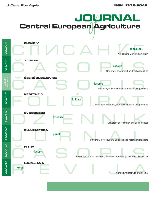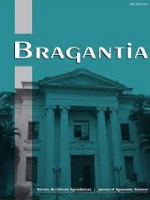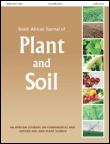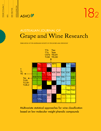
SOUTH AFRICAN JOURNAL OF ENOLOGY AND VITICULTURE
metrics 2024
Advancing the Science of Wine and Grapes
Introduction
The South African Journal of Enology and Viticulture, published by the South African Society of Enology and Viticulture (SASEV), stands as a pivotal platform for research in the fields of enology and viticulture. With an ISSN of 0253-939X and E-ISSN 2224-7904, this Open Access journal has been contributing significant scholarly work since 1980, ensuring accessibility to a broad audience of researchers, professionals, and students engaged in the viticulture and winemaking sectors. Based in Stellenbosch, South Africa, the journal has achieved commendable Q3 rankings in the fields of Food Science and Horticulture as of 2023, reflecting its growing influence in these areas. With a comprehensive converged publishing span from 2004 to 2024, the journal seeks to expand the frontiers of knowledge by publishing innovative research, reviews, and case studies that address current challenges and advancements in viticulture and enology. Researchers engaged in agricultural and biological sciences will find valuable insights, as highlighted by its Scopus ranks, particularly in horticulture (Rank #46/115) and food science (Rank #215/389), placing it in the th percentile of international academic standards.
Metrics 2024
 0.29
0.29 1.10
1.10 1.50
1.50 35
35Metrics History
Rank 2024
Scopus
IF (Web Of Science)
JCI (Web Of Science)
Quartile History
Similar Journals

Ciencia e Tecnica Vitivinicola
Innovating Horticulture: Where Research Meets ExcellenceCiencia e Tecnica Vitivinicola is a premier open-access journal dedicated to the fields of Food Science and Horticulture, published by ESTACAO VITIVINICOLA NACIONAL in Portugal. Since its inception in 2008, this journal has provided a vital platform for researchers, professionals, and students focused on advancing the scientific study of viticulture and wine technology. With a significant commitment to open access since 2014, Ciencia e Tecnica Vitivinicola encourages widespread dissemination of knowledge, thus enhancing collaboration across the global scientific community. In 2023, it achieved a commendable ranking within the Q3 and Q2 quartiles for Food Science and Horticulture, respectively, demonstrating its impact and relevance in the academic landscape. Furthermore, with Scopus ranking it at 45 out of 115 in Horticulture and 208 out of 389 in Food Science, the journal continues to uphold high standards of scholarly excellence. With its scope encompassing innovative research, technological advancements, and practical applications in viticulture, Ciencia e Tecnica Vitivinicola is an indispensable resource for those passionate about the future of wine production and horticultural practices.

International Journal of Plant Production
Exploring breakthroughs in agriculture and ecological sustainability.International Journal of Plant Production, published by SPRINGER in Switzerland, serves as a leading platform for the dissemination of innovative research in the fields of Agronomy, Crop Science, and Plant Science. With an ISSN of 1735-6814 and an E-ISSN of 1735-8043, this journal has maintained its reputation by achieving a Q2 quartile ranking in both categories as of 2023, alongside notable Scopus rankings placing it in the top quartiles of its fields (Rank #105/516 and Rank #88/406, respectively). The journal's scope encompasses a wide array of topics vital to sustainable agriculture and plant production systems, making it a critical resource for researchers, professionals, and students striving for advancements in these disciplines. By fostering open scientific dialogue and supporting cutting-edge research, the International Journal of Plant Production is committed to contributing to the resolution of global food security challenges, enhancing agricultural practices, and promoting ecological sustainability.

Journal of Central European Agriculture
Empowering Agricultural Excellence Through Open Access ScholarshipThe Journal of Central European Agriculture, with ISSN 1332-9049 and E-ISSN 1332-9049, is an esteemed platform published by UNIV ZAGREB, FAC AGRICULTURE that caters to the dynamic fields of agronomy, crop science, and animal science. Since its establishment in 2000, this Open Access journal has played a crucial role in disseminating critical research findings while fostering collaboration among academics, researchers, and professionals within the agricultural community. The journal, which is based in the heart of Croatia, spans a rich history of scholarship, with its content available for free to readers and contributors alike. As reflected in its current standings, the journal has achieved a Quartile 3 ranking in Agronomy and Crop Science and Quartile 4 in Animal Science and Zoology for the year 2023, indicating its growing influence within these disciplines. With Scopus ranks placing it in the 32nd percentile among its peers, the Journal of Central European Agriculture is committed to advancing agricultural sciences not only in Central Europe but globally as it prepares for its converged years from 2007 through 2024. This journal serves as a vital resource for innovative research, practical applications, and a deeper understanding of agricultural challenges and solutions.

BRAGANTIA
Empowering Innovation in Agriculture and BiologyBRAGANTIA, published by the Instituto Agronômico, is a distinguished open access journal that has been a vital resource since its inception in 1977. With an ISSN of 0006-8705 and E-ISSN 1678-4499, this journal is recognized for its contributions to the field of Agricultural and Biological Sciences, where it currently holds a respectable Q2 ranking as of 2023. Additionally, BRAGANTIA is indexed in various databases, supporting its impact within Materials Science (Q3 ranking). Positioned in Brazil, the journal promotes the dissemination of high-quality research, aiming to bridge the gap between academia and practical applications in agricultural innovation and sustainability. Researchers, professionals, and students looking to keep abreast of recent advancements and their implications will find BRAGANTIA to be an indispensable platform for sharing and accessing vital agricultural knowledge.

Romanian Agricultural Research
Fostering Dialogues for Sustainable Agricultural DevelopmentRomanian Agricultural Research is a prominent academic journal dedicated to advancing the field of agricultural science with a specific focus on agronomy and crop management. Published by the NATL AGRICULTURAL RESEARCH & DEVELOPMENT INST in Romania, this journal has established itself as an important resource within its discipline, evidenced by its Q3 ranking in the Agronomy and Crop Science category for 2023. With its ongoing publication since 2008, the journal provides a platform for researchers and professionals to disseminate their findings and share innovative practices that address the challenges faced in agricultural development. Although it operates under a non-open access model, Romanian Agricultural Research commits to rigorous peer-review processes, ensuring the high-quality content that enhances the academic community’s knowledge base. The journal's objective is to foster dialogues surrounding sustainable agriculture, improve crop yield, and contribute to the enhancement of agricultural practices globally. Researchers, professionals, and students will find this journal to be an invaluable repository of knowledge and a catalyst for future agricultural innovations.

POTATO RESEARCH
Transforming agriculture, one potato at a time.POTATO RESEARCH is a prestigious journal dedicated to advancing the scientific understanding of potato cultivation and its wider implications in the fields of agronomy, crop science, and food science. Published by Springer in the Netherlands, this journal boasts an impressive impact factor and ranks in the Q2 category for both Agronomy and Crop Science, as well as Food Science in 2023, affirming its significant contribution to these disciplines. With over five decades of research converged from 1970 to 2024, POTATO RESEARCH serves as a vital platform for researchers, professionals, and students interested in the latest findings and innovations that affect potato production and processing. Although it is not an open-access journal, it remains a crucial resource for those dedicated to enhancing agricultural sustainability and food security. For inquiries or submission details, please refer to their office located at Van Godewijckstraat 30, 3311 GZ Dordrecht, Netherlands.

South African Journal of Plant and Soil
Empowering agricultural science through impactful studies.South African Journal of Plant and Soil is an esteemed academic publication dedicated to advancing the fields of Ecology, Plant Science, and Soil Science. Published by TAYLOR & FRANCIS LTD in the United Kingdom, this journal has been a vital resource since its inception in 1984, providing a platform for innovative research and scholarly articles that address critical issues in plant and soil management. With a current impact factor placing it in the Q3 category according to the 2023 rankings, it occupies an influential position within the academic community, especially amongst researchers focused on agricultural and environmental sciences. Although not an open-access journal, it remains accessible to a broad audience through libraries and institutions that recognize its value in facilitating ecologically and environmentally focused discussions. The journal's ongoing commitment to publishing high-quality research ensures that it plays a pivotal role in nurturing knowledge and fostering advancements in sustainable practices across southern Africa and beyond.

Egyptian Journal of Agronomy
Driving Change in Agronomy and BeyondEgyptian Journal of Agronomy, published by the NATL INFORMATION DOCUMENTATION CENT, ACAD SCIENTIFIC RESEARCH & TECHNOLOGY, serves as a pivotal platform for researchers, professionals, and students focusing on various disciplines within the agricultural sciences, including agronomy, soil science, horticulture, and ecology. With an ISSN of 0379-3575 and E-ISSN of 2357-0288, the journal aims to bridge the gap in knowledge and innovation in the field with its comprehensive studies and frameworks. While the journal is currently categorized in low Scopus ranks, indicating immense potential for growth in influence and impact, it remains dedicated to providing quality research and fostering advancements in agronomic practices. Set in Egypt, a hub for agricultural research, the journal is committed to reflecting the regional and global challenges in agriculture. The Egyptian Journal of Agronomy is a vital resource for anyone engaged in the evolving landscape of agricultural science, offering insights that promote sustainable practices and address current issues facing the sector.

AUSTRALIAN JOURNAL OF GRAPE AND WINE RESEARCH
Cultivating Research for a Sustainable Wine IndustryAustralian Journal of Grape and Wine Research, published by Wiley, is a premier academic journal dedicated to advancing knowledge in the field of viticulture and enology. With an impressive impact factor reflecting its significance, the journal is ranked in the Q1 quartile for Horticulture, placing it among the top-tier journals in its category, and enjoys a commendable ranking of #15/115 in Scopus for Agricultural and Biological Sciences. The journal has been serving the scientific community since its inception in 1995 and continues to be a vital resource for researchers, professionals, and students engaged in grape and wine research. Accessible through subscription, it provides a platform for publishing innovative research findings and insightful reviews that foster discourse in viticulture, wine quality, and sustainability practices. For anyone passionate about the science of grapevine cultivation and wine production, the Australian Journal of Grape and Wine Research is an indispensable source of knowledge and inspiration.

VITIS
Transforming Vine Science into Practical InsightsVITIS is a distinguished journal published by the Julius Kuhn Institute (JKI), based in Germany, dedicated to advancing the field of viticulture and enology. With a long-standing history dating back to 1981, VITIS serves as a vital platform for researchers, professionals, and students alike, focusing on critical insights and innovations related to vine genetics, cultivation, and grape quality. Although the journal operates under a traditional access model, its commitment to publishing high-quality, peer-reviewed research contributes to its relevance, as indicated by its current rankings of Q4 in Genetics and Q3 in Horticulture for 2023. Furthermore, with its Scopus rankings placing it within the agricultural and biological sciences community, VITIS plays an essential role in disseminating vital knowledge to enhance viticultural practices. Researchers and practitioners are encouraged to explore the breadth of studies published, contributing to the ongoing dialogue in horticulture and plant genetics.